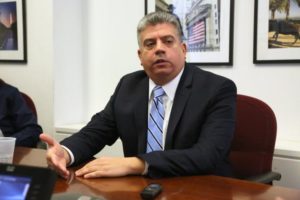by WorldTribune Staff, May 4, 2017
Illegal aliens will get a pass on minor, non-violent crimes they commit in Brooklyn and Baltimore, a report said.
Prosecutors have ordered their staffs not to charge illegals with minor, non-violent crimes because it could get the offenders deported, Judicial Watch reported in its May 4 Corruption Chronicles blog.

According to a statement from District Attorney Eric Gonzalez’s office, the Brooklyn DA’s office is “minimizing collateral immigration consequences of criminal convictions” to avoid “disproportionate collateral consequences, such as deportation, while maintaining public safety.”
Gonzalez insists the new policy “doesn’t compromise but rather compliments his agency’s goal of enhancing public safety and fairness in the criminal justice system,” Judicial Watch said.
Under the old system in which all violators of state crimes were treated equally undocumented immigrants faced harsh immigration penalties as a result of criminal convictions, Gonzalez said, even for minor offenses.
“Now more than ever, we must ensure that a conviction, especially for a minor offense, does not lead to unintended and severe consequences like deportation, which can be unfair, tear families apart and destabilize our communities and businesses,” Gonzalez said. “In Brooklyn, we have been proactive in protecting immigrants from fraud and hate crimes and now, with the unprecedented hiring of immigration attorneys and the implementation of this policy, we continue to lead on this important issue.”
Taxpayers in Brooklyn are paying for two immigration attorneys to train all staff on immigration issues and advise prosecutors when making plea offers and sentencing recommendations, the report said.
The head of a local open borders group celebrated the new rules, asserting that “misdemeanors and low-level offenses often trap immigrants who are unfamiliar with the legal process and potentially expose them to harsh double punishment of being deported and ripped from their families.”
Under Brooklyn’s new policy lawyers in the prosecutor’s office may consider “alternative offenses the defendant can plead to as well as reasonable modifications to the sentence recommendation.” As an example, the District Attorney’s directive says that a plea to a misdemeanor trespass may be offered instead of a misdemeanor drug offense. Illegal aliens may also be offered a plea for a lesser offense “in light of the disproportionate immigration consequences a higher level offense may result in,” according to the new rules.
Meanwhile, in Baltimore, “there was no public announcement or celebratory press conference but a local newspaper got hold of an internal memo sent by Baltimore’s Chief Deputy State’s Attorney instructing prosecutors to think twice before charging illegal immigrants with minor, non-violent crimes,” the Corruption Chronicles blog noted.
In the memo, Michael Schatzow wrote that the Trump administration’s deportation efforts “have increased the potential collateral consequences to certain immigrants of minor, non-violent criminal conduct.”
In considering the appropriate disposition of a minor, non-violent criminal case, please be certain to consider those potential consequences to the victim, witnesses, and the defendant,” Schatzow wrote to his staff.
Earlier this year, in response to the Trump administration’s immigration enforcement policies, Baltimore Mayor Catherine Pugh reiterated that police and other public agencies in her city never ask about immigration status. “We are a welcoming city,” the mayor said in a local news report “We want everyone here. We want to be able to provide opportunities and jobs and careers for folks. That’s where we are in Baltimore.”
Besides Baltimore, two Maryland counties – Montgomery and Prince George’s – offer illegal immigrants sanctuary.
This year Maryland legislators tried to pass a measure to make the state an official illegal alien sanctuary but the bill, known as the Trust Act, hit a roadblock in a Senate committee after passing in the House of Delegates and the governor has vowed to veto it even if it survives.
